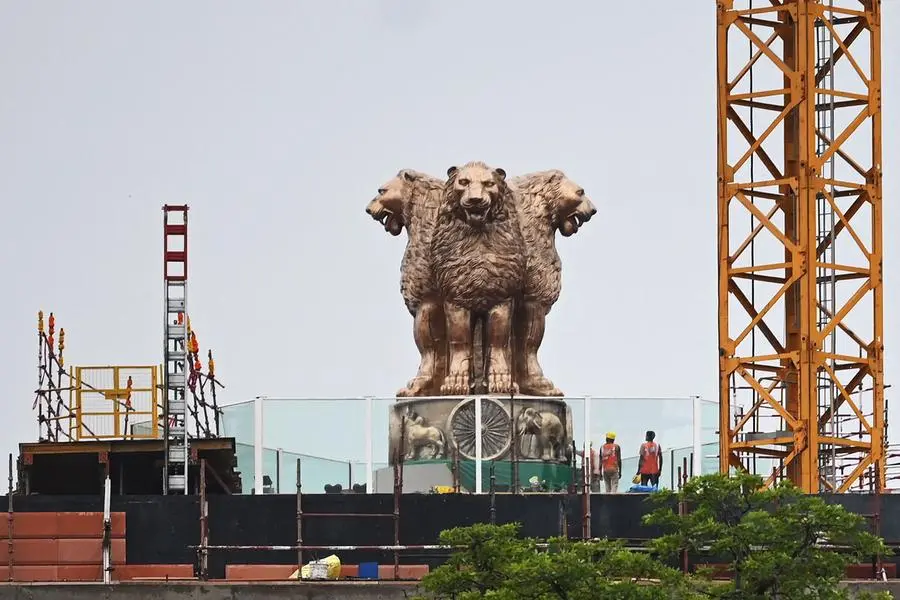PHOTO
The world's most populous country inaugurates a new parliament Sunday, the latest step in Hindu nationalist Prime Minister Narendra Modi's plans to reshape India's capital, but opposition parties are denouncing it as a "grave insult" to democracy.
Modi has long sought to eliminate vestiges of British rule and the grand new hexagonal legislature stands next to the colonial-era building designed by British architects Edwin Lutyens and Herbert Baker that it will replace.
It is one of several mega projects around key cultural and religious sites championed by the right-wing leader.
They include a grand temple corridor in Varanasi, a mega statue to a Hindu warrior king who successfully challenged the Muslim Mughal rulers and a grand temple at the Ayodhya site where zealots destroyed a Mughal-era mosque three decades ago.
India's powerful interior minister Amit Shah, a key Modi confidant, said the new parliament was a sign of "self-reliant India and a centre for fulfilling hopes and aspirations of all Indians".
But critics say the project has been politicised for party purposes, with Sunday's opening to be carried out by Modi himself, rather than the country's head of state, President Droupadi Murmu.
The main opposition Congress and 19 other political parties are boycotting the ceremony as a result.
"History won't remember you just because you made a good building," said Congress party spokesman Pawan Khera.
"History will remember whether you ensured that the soul in that building is also alive. History would remember you for that but you are throttling voices within the parliament."
There is wide agreement that the cramped existing parliament -- with outdated facilities and not enough offices or committee rooms -- needs replacing.
The new legislature has reportedly cost about $145 million and is part of a grand project aimed at revamping or replacing British-era government facilities in the centre of New Delhi, including a new residence for the prime minister.
The Central Vista project has faced criticism from the outset over a lack of transparency, high costs and allegations that it violated both environmental and local land laws.
The chamber of the lower house will have 888 seats -- significantly more than its current maximum membership of 550, an indication that authorities plan a major expansion in their numbers.
That could boost Modi's ruling Bharatiya Janata Party: if the seats are increased according to the most recent census numbers, its heartland in the densely populated north and centre will get much higher representation than India's more developed and affluent south, where the BJP remains relatively weaker.
- Lessons of history -
The irony of the parliament opening is that critics accuse Modi and the BJP -- which has won two successive landslides and is campaigning hard ahead of a general election next year -- of undermining electoral politics itself.
"Under Modi, deep institutional functioning of democracy, best represented by parliament, has actually come apart," said Hartosh Singh Bal, executive editor of Indian current affairs magazine The Caravan.
"The whole tradition of debate, dissent, questioning and argument that actually makes for a coherent polity has been entirely missing or has been destroyed."
Opponents accuse the BJP of stifling debate inside parliament and deploying tax raids, federal probes and legal action to weaken key opposition figures.
The legislature saw a string of noisy disruptions in February as the government blocked opposition demands -- led by Congress leader Rahul Gandhi -- for a probe into potential links between Modi and the business empire of tycoon Gautam Adani, which has been hit by allegations of accounting fraud. It denies those accusations.
Gandhi, the embattled scion of India's most famous political dynasty, was disqualified from the lower parliament house days later, after he was sentenced to two years imprisonment in an unrelated criminal defamation case over a campaign remark in 2019.
His party spokesman Khera pointed to the BJP's campaign slogan when it first won power in 2014, "India without Congress."
"They want the democracy without opposition," he said. "Tell me how can there be any democracy without opposition?"
But Amit Malviya, who heads the BJP's social media campaign efforts, sought to cast the row over the parliament opening in the context of colonialism, citing the 1927 inauguration of the current building by Viceroy Lord Irwin and attended by Gandhi's great-great-grandfather Motilal Nehru.
"The Congress, which then had no compunction genuflecting in front of the British, today, has a problem attending the inauguration, even though the person helming the ceremony is a democratically elected prime minister," he told AFP.
"What explains Congress's loyalty towards the British and disdain for the people of India?" he alleged.





















